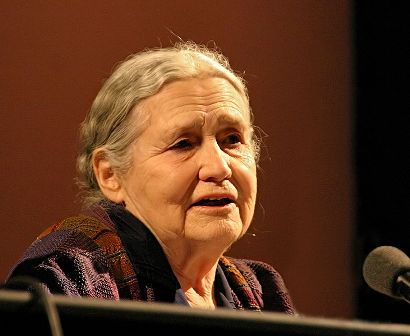a feminist icon, but not a feminist?: celebrating the late doris lessing
Last week the Nobel Prize winning author, Doris Lessing died aged 94. During her career that spanned over 70 years, she was awarded a “royal flush” of major literary awards for her 60+ published works, ranging from science-fiction novels, to poetry, to memoirs of her childhood in Africa. The Nobel Prize committee dubbed her ‘that epicist of the female experience, who with scepticism, fire and visionary power has subjected a divided civilisation to scrutiny’.
Doris Lessing was more a visionary than a feminist; a visionary that happened to be female. Despite her constant appearance in the lists of top feminist writers, Lessing openly criticised any descriptions of herself as a feminist. Being pigeonholed was not something she was interested in, and the label “feminist author” can be reductive.
Yet, Lessing is a feminist icon: while she spoke of life in all its complexities, her writing speaks powerfully of female experiences. Her 1962 novel, The Golden Notebook, is perhaps her most successful novel and has made her a figurehead of feminist literature. The Golden Notebook centres on an independent woman’s relationships with men and women in a time of re-examining sexual and political norms.
At some point in my literature major I found an obligatory Doris Lessing book on a course list. It was African Laughter, a memoir of four return trips Lessing made to her childhood home in Zimbabwe. In her life, Lessing was declared a “prohibited immigrant” to her country for political reasons, so her relationship to Zimbabwe is complex and shaky. This was not a course concerned with feminism in particular, and her status as a feminist was a side issue, surprisingly, considering her feminism is what she is best known for. Perhaps what came through as most important in her life was her status as a radical figure, her (controversial) alignment with the feminist movement being only one aspect of her activism and progressive voice.
Lessing was unafraid to be outspoken. In 2007, just outside her London home, a reporter informed her she’d won the Nobel Prize for Literature. She responded, ‘Oh Christ’, and returned to her business of paying the taxi. In the YouTube clip of the incident, she gets out of the cab slowly, looking fragile, and this makes her no-nonsense remarks brushing aside the victory all the more powerful. She pushes aside the reporters, not rudely, but not submitting to offering the words of gratitude expected. She had previously pulled a stunt in the mid 1980s to expose the unfairness of the publishing industry, submitting the manuscript to her novel, The Diary of a Good Neighbour, under a pseudonym. It was promptly rejected, sparking controversy, and illustrating her argument that unknown authors could not get a fair share of attention and publication.
Lessing was only the 11th woman to win the Nobel Prize since its instatement in 1901. She was a woman who paved the way for future female writers in a field that continues to be dominated by male authors at the level of its highest prizes. Lessing did not always fit into the “feminist” frame assigned to her. Somewhat overlooked by fans in their measures to idealise her is her leaving her two children from her first marriage in Africa when she moved to England to pursue her career.
Lessing was an intellectual and visionary writer. Naturally, her position in the world as a female was a major part of her identity, and one many clung to for inspiration at a time when her vision and power was progressive and brought strength to the feminist movement. Her dislike of this term makes her all the more interesting, and the multiple directions her writing confronts brings strength to her as a writer – and to the feminist movement – showing a female writer can be successful, progressive and can discuss the female perspective amongst the other interests of the author. However, the public tendency to classify her work as “women’s writing” or of a “feminist perspective” says something about the way women with feminist ideals can be reduced, making their success and ideas as a contribution to women, rather than all people, which a highly accomplished author like Lessing reaches.


